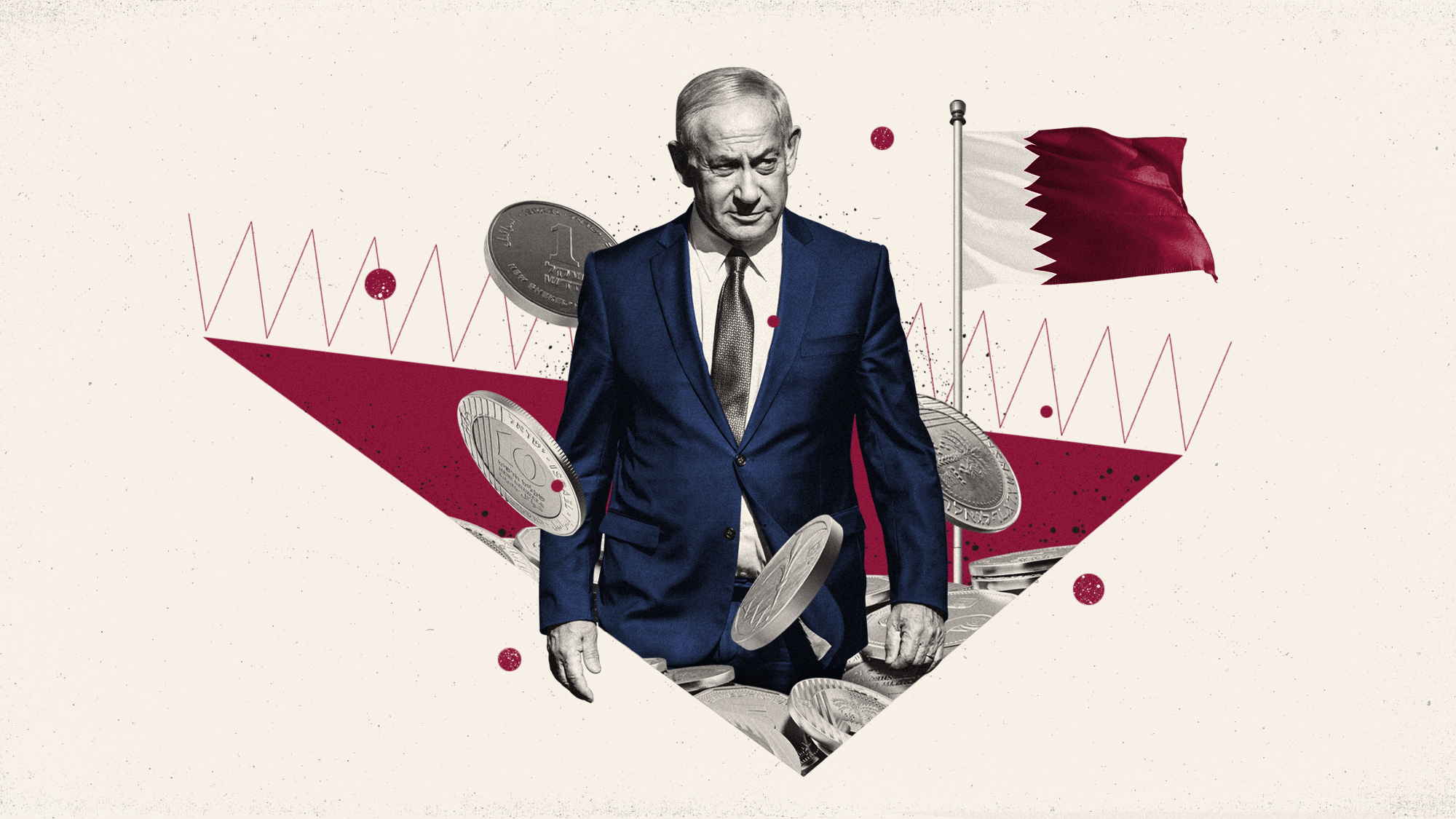Benjamin Netanyahu's Qatar problem
Two of the Israeli prime minister's key advisers are accused of taking bribes from the Gulf state in exchange for favourable publicity

A free daily email with the biggest news stories of the day – and the best features from TheWeek.com
You are now subscribed
Your newsletter sign-up was successful
Israel's Prime Minister Benjamin Netanyahu has so far remained impervious to the controversies that have dogged his career. But the question of how a foreign power viewed as an enemy to Israel was able to infiltrate the highest levels of his government could prove a scandal too far.
"Qatargate" focuses on an investigation into two of his close aides receiving payments from the Qatari government to give the country favourable publicity in Israel and internationally.
The scandal broke as Netanyahu was giving testimony in his corruption case hearing in Tel Aviv, in which he is accused of bribery and fraud. Netanyahu denies any wrongdoing. A police summons forced the prime minister to leave his hearing after his aides, Jonatan Urich and Eli Feldstein, were arrested.
The Week
Escape your echo chamber. Get the facts behind the news, plus analysis from multiple perspectives.

Sign up for The Week's Free Newsletters
From our morning news briefing to a weekly Good News Newsletter, get the best of The Week delivered directly to your inbox.
From our morning news briefing to a weekly Good News Newsletter, get the best of The Week delivered directly to your inbox.
Netanyahu has called the investigation a "political witch hunt" with "baseless" accusations and, though he is not implicated himself in Qatargate, "the affair has piled more pressure" on him, said AFP.
What are the accusations?
Urich, who is Netanyahu's "top spin doctor", and Feldstein, his "spokesman for military affairs", are both accused of accepting money in exchange for "burnishing Qatar’s image", said The Economist. In a separate investigation, Feldstein is also accused of having "leaked state secrets to a German newspaper" to change the "discourse surrounding ceasefire talks with Hamas".
As well as the promotion of Qatar's image, the two men are also accused of taking payments to help in "marginalising Egypt". "If proven" this could give "credence" to the notion that Qatar is operating as a "strategic competitor to Egypt". Egypt has a "strong interest in ending the war" because of its proximity to Gaza, said The Jerusalem Post.
Both Urich and Feldstein are being investigated by the Israeli internal security service Shin Bet, whose chief Ronen Bar has been at odds with Netanyahu for some time. Relations between the pair have long been "strained", said The Observer, but the "relationship further deteriorated" after Shin Bet publicly pointed to government failures that led to the 7 October attack by Hamas.
A free daily email with the biggest news stories of the day – and the best features from TheWeek.com
In an "overlapping scandal", Netanyahu has tried to remove Bar from his position since the Qatargate investigation began. However, the decision was suspended by the Supreme Court pending filings from the opposition.
Why are they significant?
Qatargate has been front and centre in the Israeli media in recent weeks, not only because it envelops those at the top of government in another scandal, but because Qatar is perceived to be a long-time supporter of Hamas.
Doha has for years been Hamas' biggest financial backer. It has sent millions of dollars into Gaza, payments that were "welcomed" by the Netanyahu government, said The New York Times. While the payments were "ostensibly a secret", it was "widely known" that the government operated with the strategy that, prior to 7 October, the money would keep Hamas "focused on governing, not fighting". This was based on the "flawed assessment that Hamas was neither interested in nor capable of a large-scale attack". There is now the belief that the payments gave Hamas "the time and funds to plan its assault on Israel", said The Economist.
Despite the 7 October attack, the Israeli government has maintained "close ties with Qatar", which has played a key role in negotiations between Israel and Hamas, said Ynetnews. The news that the main financier of Israel's enemy is allegedly buying positive publicity through "individuals with ties to the political elite" has sent "shockwaves through Israel".
What will happen to Netanyahu?
What kind of punishment Urich and Feldstein would receive if found guilty is currently unclear. Urich's lawyer has argued that "his client is not a civil servant" and therefore can't be charged with the crimes that would apply to civil servants, like bribery and breach of trust, said The Times of Israel. The judge overseeing the case "rejected this argument" on the precedent that it is "the essence of their job" that defines if they are working as a civil servant.
For Netanyahu, it is a headache to add to a growing list as he tries to maintain public support. The prime minister is "no stranger to scandal" and "has always managed to find a way to cling on to power – and public support", said The Observer. The Qatargate scandal, however, "may yet widen" and Israel may slip into a "constitutional crisis" if the Supreme Court rules in favour of Bar.
How Netanyahu navigates these tricky waters "hinges on the prime minister’s formidable instinct – and redoubtable talent – for self-preservation".
Richard Windsor is a freelance writer for The Week Digital. He began his journalism career writing about politics and sport while studying at the University of Southampton. He then worked across various football publications before specialising in cycling for almost nine years, covering major races including the Tour de France and interviewing some of the sport’s top riders. He led Cycling Weekly’s digital platforms as editor for seven of those years, helping to transform the publication into the UK’s largest cycling website. He now works as a freelance writer, editor and consultant.
-
 How the FCC’s ‘equal time’ rule works
How the FCC’s ‘equal time’ rule worksIn the Spotlight The law is at the heart of the Colbert-CBS conflict
-
 What is the endgame in the DHS shutdown?
What is the endgame in the DHS shutdown?Today’s Big Question Democrats want to rein in ICE’s immigration crackdown
-
 ‘Poor time management isn’t just an inconvenience’
‘Poor time management isn’t just an inconvenience’Instant Opinion Opinion, comment and editorials of the day
-
 ‘Bad Bunny’s music feels inclusive and exclusive at the same time’
‘Bad Bunny’s music feels inclusive and exclusive at the same time’Instant Opinion Opinion, comment and editorials of the day
-
 Is the Gaza peace plan destined to fail?
Is the Gaza peace plan destined to fail?Today’s Big Question Since the ceasefire agreement in October, the situation in Gaza is still ‘precarious’, with the path to peace facing ‘many obstacles’
-
 How Iran protest death tolls have been politicised
How Iran protest death tolls have been politicisedIn the Spotlight Regime blames killing of ‘several thousand’ people on foreign actors and uses videos of bodies as ‘psychological warfare’ to scare protesters
-
 The Board of Peace: Donald Trump’s ‘alternative to the UN’
The Board of Peace: Donald Trump’s ‘alternative to the UN’The Explainer Body set up to oversee reconstruction of Gaza could have broader mandate to mediate other conflicts and create a ‘US-dominated alternative to the UN’
-
 Israel’s E1 zone in the West Bank: the death of the two-state solution?
Israel’s E1 zone in the West Bank: the death of the two-state solution?The Explainer Controversial new settlement in occupied territories makes future Palestinian state unviable, critics claim
-
 ‘The security implications are harder still to dismiss’
‘The security implications are harder still to dismiss’Instant Opinion Opinion, comment and editorials of the day
-
 ‘Let 2026 be a year of reckoning’
‘Let 2026 be a year of reckoning’Instant Opinion Opinion, comment and editorials of the day
-
 What have Trump’s Mar-a-Lago summits achieved?
What have Trump’s Mar-a-Lago summits achieved?Today’s big question Zelenskyy and Netanyahu meet the president in his Palm Beach ‘Winter White House’